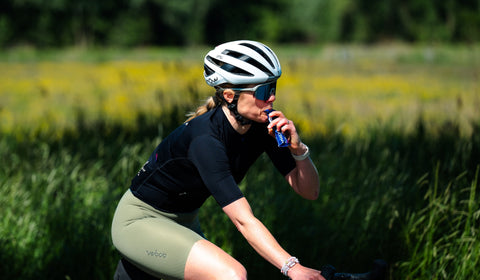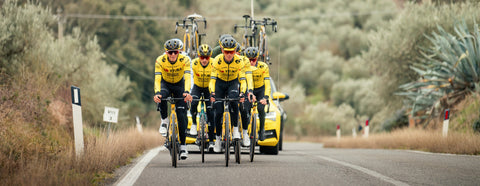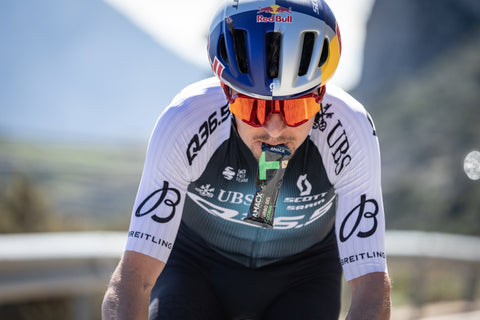Rice, pasta or oatmeal, just some classic examples of foods that are often eaten prior to important sports performances. But sports drinks, energy gels or a banana during exercise are also frequent guests. What do all these products have in common? They are rich in carbohydrates! This nutrient can be responsible for a great feeling on the bike, but also for the dreaded hunger pangs. You can read how many carbohydrates you need during your effort in this blog.
In summary:
- Carbohydrates are the main fuel during exercise, especially when the intensity increases.
- Due to the limited storage possibilities in the body, we must continue to replenish carbohydrates during exercise if duration and/or intensity increase.
- During efforts of up to 60 to 75 minutes, drinking water is sufficient (if the glycogen stores are well filled in advance). Regularly rinsing your mouth with a carbohydrate-rich drink can improve your performance.
- During efforts of 75 to 150 minutes, it is recommended to take 30 to 60 grams of carbohydrates per hour. This is equivalent to 1 to 2 Amacx products per hour.
- During efforts longer than 150 minutes, it is recommended to aim for higher intakes with a maximum of 90 to 120 grams of carbohydrates per hour. This is equivalent to 2-4 Amacx products per hour.
The importance of carbohydrates
Carbohydrates, together with fats, are the main source of fuel during exercise. When the duration or intensity of an effort increases, and with it the energy requirement of the body increases, the importance of carbohydrates becomes greater and greater. However, there is one crucial point for attention: the storage capacity of this fuel in the body is limited. This nutrient is stored in our body in the form of glycogen, mainly in the muscles and to a lesser extent in our liver. This glycogen stock is, as it were, the body's fuel tank.
Prevent the hunger pangs
These limited storage options ensure that filling, maintaining and replenishing before, during and after a strenuous effort requires precision. A suboptimal intake in one of these stages can negatively affect your performance and/or recovery. When you have completely filled your glycogen tank before a training or competition, that is sufficient for about 75 to 90 minutes of effort. However, when the intensity of the exercise is high, the glycogen stock can be depleted much faster (eg during a course on Zwift or intensive interval training). When that happens, the well-known and dreaded 'hunger knock' occurs: you will have to end the effort abruptly because the bottom of your fuel tank has simply been reached.
Eating and drinking carbohydrate-rich products during exercise slows down the consumption of your own glycogen stores. With a good nutrition plan you can avoid a hunger knock. And perhaps even more important: by keeping the carbohydrate supply in the body sufficiently up to standard, you can continue to deliver a higher quality until the end of the training, which is also accompanied by a better focus and a more pleasant feeling.
Carbohydrates and short efforts
Therefore, always make sure that you are well prepared for your training or competition. If your effort lasts 60 to 75 minutes, it is sufficient to fill your glycogen stores well prior to this and to drink only water during the effort. The only added value that carbohydrates can offer during such a relatively short effort is the so-called 'mouthwashing' with a sugary drink. Various studies show that rinsing in your mouth a few times (5 to 10 seconds) improves performance (e.g. with an isotonic sports drink or soft drink). This is because a signal goes directly from the mouth to the brain that 'tells' that new energy is on its way. This then ensures that the feeling of fatigue is suppressed, and the energy that is already stored in the body is released a little faster. This ultimately makes your effort easier and faster.
If your training or competition lasts longer than 60 to 75 minutes, it is advisable to aim for 30 to 60 grams of carbohydrates per hour. This is equivalent to 1 to 2 Amacx products per hour (e.g. 1 bottle of Isotonic Energy Drink + 1 Energy Oat Bar). Start this from the first hour and continue it evenly throughout the workout. This ensures that you do not reach the bottom of your glycogen stores (= 'fuel tank'). If your effort lasts longer than 2 to 2.5 hours, it is recommended to increase the carbohydrate intake a little further to 90 or even 120 grams per hour. With these high intakes, it is crucial to select products with the correct carbohydrate ratio. It is crucial to train these high intakes regularly and gradually increase them, read in this blog about 120 grams of carbohydrates per hour.
Duration of the effort |
Carbohydrate intake per hour |
|
< 60 to 75 minutes |
None (only “mouthwash”) |
|
60 to 120 minutes |
30 to 60 grams per hour |
|
> 120 minutes |
60 to 90 grams per hour |
|
Extreme endurance |
90 to 120 grams per hour |
Don't forget that in addition to the duration, the intensity of the effort also plays an important role in your carbohydrate requirement. Is there an interval training planned or are you planning to ride your bike for an afternoon? Always aim for the higher intake within the above ranges.
You can read how many carbohydrates you need before or after an effort in our blogs about competition preparation and recovery.












